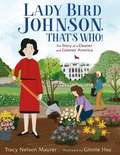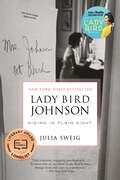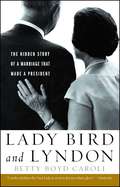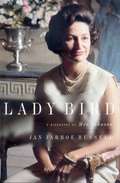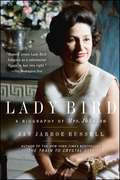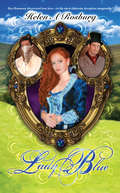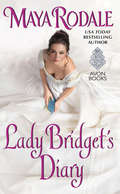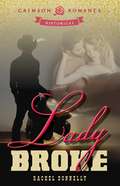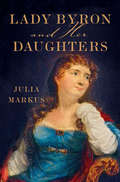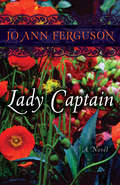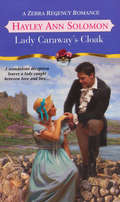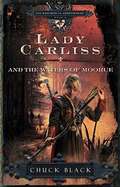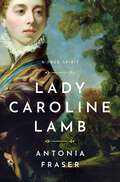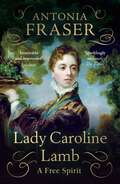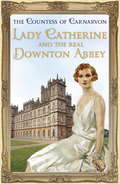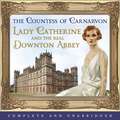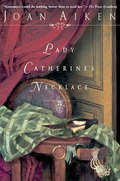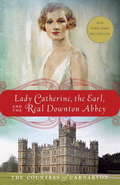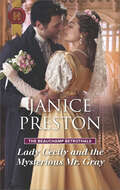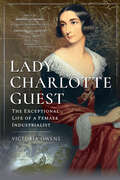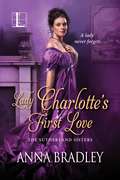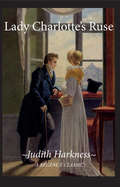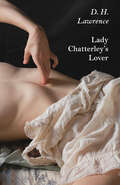- Table View
- List View
Lady Bird Johnson, That's Who!: The Story of a Cleaner and Greener America
by Tracy Nelson MaurerLady Bird Johnson, That's Who! is Tracy Nelson Maurer's lively picture book biography of Lady Bird Johnson, with a focus on her environmentalist passion and legacy as First Lady.Who fought to stop pollution? Who helped make America cleaner and greener? Lady Bird Johnson, That's Who!Claudia Alta Taylor was a lonely girl, shy as a butterfly growing up in Texas. She never dreamed she'd blossom into a visionary leader whose love for wildflowers, beautiful landscapes, and building community compelled her to lead the effort to combat pollution in the United States. A lifelong environmentalist, Lady Bird Johnson embraced her platform as First Lady to promote policy that beautified America’s roadways, waterways and parks, inspiring people to take pride in the places they live.With elements of women’s history, civics, and conservationism, this is a timely and informative picture book biography.
Lady Bird Johnson: Hiding in Plain Sight
by Julia SweigA magisterial portrait of Lady Bird Johnson, and a major reevaluation of the profound yet underappreciated impact the First Lady's political instincts had on LBJ’s presidency. <P><P>In the spring of 1964, President Lyndon B. Johnson had a decision to make. Just months after moving into the White House under the worst of circumstances—following the assassination of President John F. Kennedy—he had to decide whether to run to win the presidency in his own right. He turned to his most reliable, trusted political strategist: his wife, Lady Bird Johnson. The strategy memo she produced for him, emblematic of her own political acumen and largely overlooked by biographers, is just one revealing example of how their marriage was truly a decades-long political partnership. <P><P>Perhaps the most underestimated First Lady of the twentieth century, Lady Bird Johnson was also one of the most accomplished and often her husband's secret weapon. Managing the White House in years of national upheaval, through the civil rights movement and the escalation of the Vietnam War, Lady Bird projected a sense of calm and, following the glamorous and modern Jackie Kennedy, an old-fashioned image of a First Lady. In truth, she was anything but. As the first First Lady to run the East Wing like a professional office, she took on her own policy initiatives, including the most ambitious national environmental effort since Teddy Roosevelt. <P><P>Occupying the White House during the beginning of the women's liberation movement, she hosted professional women from all walks of life in the White House, including urban planning and environmental pioneers like Jane Jacobs and Barbara Ward, encouraging women everywhere to pursue their own careers, even if her own style of leadership and official role was to lead by supporting others. Where no presidential biographer has understood the full impact of Lady Bird Johnson’s work in the White House, Julia Sweig is the first to draw substantially on Lady Bird’s own voice in her White House diaries to place Claudia Alta "Lady Bird” Johnson center stage and to reveal a woman ahead of her time—and an accomplished politician in her own right. <P><P><b>A New York Times Best Seller</b>
Lady Bird and Lyndon: The Hidden Story of a Marriage That Made a President
by Betty Boyd CaroliA fresh look at Lady Bird Johnson that upends her image as a plain Jane who was married for her money and mistreated by Lyndon. This Lady Bird worked quietly behind the scenes through every campaign, every illness, and a trying presidency as a key strategist, fundraiser, barnstormer, peacemaker, and indispensable therapist.Lady Bird grew up the daughter of a domineering father and a cultured but fragile mother. When a tall, pushy Texan named Lyndon showed up in her life, she knew what she wanted: to leave the rural Texas of her childhood and experience the world like her mother dreamed, while climbing the mountain of ambition she inherited from her father. She married Lyndon within weeks, and the bargain they struck was tacitly agreed upon in the courtship letters they exchanged: this highly gifted politician would take her away, and she would save him from his weaknesses. The conventional story goes that Lyndon married Lady Bird for her money, demeaned her by flaunting his many affairs, and that her legacy was protecting the nation's wildflowers. But she was actually a full political partner throughout his ascent--the one who swooped in to make the key call to a donor, to keep the team united, to campaign in hostile territory, and to jumpstart him out of his paralyzing darkness. And while others were shocked that she put up with his womanizing, she always knew she had the upper hand. Lady Bird began the partnership by using part of her nest egg to help finance Lyndon's first political campaign. Over and over, she kept him from quitting, including the 1948 election when he was so immobilized with self-pity that she had to pick up the phone to solicit donations on his behalf. She was also the one who got him out of bed, when he was in a deep funk, to go to the 1964 Democratic nominating convention. In Lady Bird and Lyndon, Betty Boyd Caroli restores Lady Bird to her rightful place in history, painting a vivid portrait of a marriage with complex, but familiar and identifiable overtones.
Lady Bird: A Biography of Mrs. Johnson
by Jan Jarboe RussellLong obscured by her husband's shadow, Claudia "Lady Bird" Johnson emerges in this first comprehensive biography as a figure of surprising influence and the centering force for LBJ, a man who suffered from extreme mood swings and desperately needed someone to help control his darker impulses. Expertly researched and written, Lady Bird draws from rare conversations with the former First Lady and from interviews with key members of Johnson's inner circle of friends, family, and advisers. With chapters such as "Motherless Child," "A Ten- Week Affair," and "LBJ's Midlife Crisis," Lady Bird sheds new light on Mrs. Johnson's childhood, on her amazing acumen as a businesswoman, and on the central role she played in her husband's life and political career. A vital link to the Kennedys during LBJ's uneasy tenure as vice president and a voice of conscience on civil rights, Lady Bird is portrayed here as a political force, strikingly different from the somewhat minor figure depicted in previous works on LBJ. Especially fascinating today, in light of the enormous attention now focused on the private lives of our leaders, are the personal details about her marriage to a man whose extramarital affairs were widely discussed. In this intimate portrait, Russell shows us the private Lady Bird-not only a passionate conservationist but a remarkable woman who greatly influenced her husband, his administration, and the country.
Lady Bird: A Biography of Mrs. Johnson (Biography Ser.)
by Jan Jarboe RussellA revealing biography of Lady Bird Johnson with startling new insights into her marriage to Lyndon Baines Johnson and her unexpectedly strong impact on his presidency. Long obscured by her husband's shadow, Claudia "Lady Bird" Johnson emerges in this first comprehensive biography as a figure of surprising influence and the centering force for LBJ, a man who suffered from extreme mood swings and desperately needed someone to help control his darker impulses. Expertly researched and written, Lady Bird draws from rare conversations with the former First Lady and from interviews with key members of Johnson's inner circle of friends, family, and advisers. With chapters such as "Motherless Child," "A Ten-Week Affair," and "LBJ's Midlife Crisis," Lady Bird sheds new light on Mrs. Johnson's childhood, on her amazing acumen as a businesswoman, and on the central role she played in her husband's life and political career. A vital link to the Kennedys during LBJ's uneasy tenure as vice president and a voice of conscience on civil rights, Lady Bird is portrayed here as a political force, strikingly different from the somewhat minor figure depicted in previous works on LBJ. Especially fascinating today, in light of the enormous attention now focused on the private lives of our leaders, are the personal details about her marriage to a man whose extramarital affairs were widely discussed. In this intimate portrait, Russell shows us the private Lady Bird -- not only a passionate conservationist but a remarkable woman who greatly influenced her husband, his administration, and the country.
Lady Blue
by Helen A RosburgWritten with humor as well as suspense, this love story depicts a young woman in captivity who yearns for her duplicitous lover. After the death of her affluent parents, Harmony Simmons loses everything-including her freedom. Forced to move to England and live with her domineering and jealous older sister Agatha, Harmony's existence becomes restricted to the prim atmosphere of an English parlor, a stifling environment compared to the expansive American West of her former, privileged life. With her spirit crushed by her confinement, she meets Anthony Allen-a rogue who immediately falls for Harmony. He falsifies his inheritance and introduces himself as the suave aristocrat Lord Farmington. As they begin their romance, Harmony slowly recognizes the ruse behind his persona and starts to question whether her mysterious lover is a cavalier bandit or an honorable hero. Yet, his secret does nothing but ignite her passion for him as she strives to uncover his past.
Lady Bridget's Diary
by Maya RodaleIn the first novel of Maya Rodale's stunning new series, an American heiress must learn to navigate London society and an infuriatingly irresistible rake . . .Lord Darcy is the quintessential Englishman: wealthy, titled, impossibly proper, and horrified that a pack of Americans has inherited one of England's most respected dukedoms. But his manners, his infamous self-restraint, and his better judgment fly out the window when he finds himself with the maddening American girl next door.Lady Bridget Cavendish has grand--but thwarted--plans to become a Perfect Lady and take the haute ton by storm. In her diary, Bridget records her disastrous attempts to assimilate into London high society, her adoration of the handsome rogue next door, her disdain for the Dreadful Lord Darcy, and some truly scandalous secrets that could ruin them all.It was loathing at first sight for Lady Bridget and Lord Darcy. But their paths keep crossing . . . and somehow involve kissing. When Lady Bridget's diary goes missing, both Darcy and Bridget must decide what matters most of all--a sterling reputation or a perfectly imperfect love.
Lady Broke
by Rachel DonnellyEast meets west when a high-principled Boston socialite teams up with a revenge driven bounty hunter to catch a gang of outlaws in the wilds of Nevada.It's tough being a witness when the last one turned up dead. But Christie Wallace is determined to bring the Everett gang to justice. Unfortunately, the law can't protect her from pistol-toting outlaws or the intoxicating lure of a dangerous man. But, after escaping the suffocating prospects of an arranged marriage, she has no intention of allowing her heart to rule her head, even when temptation comes in the form of an incorrigible lawman named Nat Randall.Dead or alive - it made no difference to Nat Randall. He's tried to bring the Everett gang to trial once before, but the law let him down. It seems frontier justice is all he has left. But he didn't count on protecting a bewitching Easterner whose courageous spirit challenges him as much as her beauty distracts. It's not long before he's torn between pursuing her or the outlaws.A timeless, rollicking adventure of unlikely lovers, set in the Wild West.Sensuality Level: Sensual
Lady Byron and Her Daughters
by Julia MarkusThe center of public attention after her tumultuous marriage to Lord Byron, Annabella Milbanke transformed herself from a neglected wife into a figure of incredible resilience and social vision. After she and her infant child were cast out of their home, she was left to navigate the stifling and unsupportive social environment of Regency England. Far from a victim or an obstacle to Byron's work, however, Lady Byron was a rebel against the fashionable snobbery of her class, founding the first Infants School and Co-Operative School in England. A poet and talented mathematician, Lady Byron supported the education of her precocious daughter, Ada Lovelace, now recognized and lauded as a pioneer of computer science, and saved from death her "adoptive daughter" Medora Leigh, the child of Lord Byron's incest with his sister. Lady Byron was adored by the younger abolitionist Harriet Beecher Stowe and by many notable friends. Yet her complex relationships with her family, including the sister Byron loved, runs like a live wire through this skillfully told and groundbreaking biography of a remarkable woman who made a life for herself and became a leading light in her century.
Lady Captain
by Jo Ann FergusonIn Nashville, Eden Roberts has kept her steamboat, her crew, and her sister out of the Civil War as much as possible, but the war comes looking for her in the form of Fletcher Campbell, a Yankee sergeant. They get off on the wrong foot right from the beginning when he cannot believe a woman is the captain of the boat and she tries to refuse to let him requisition her boat . . . to take prostitutes out of Nashville to keep them away from the Union troops. Forced to work together, they learn blind devotion offers no reward except destruction. It gives no haven from war and allows for no peace. Even in hearts that are loyal to Union blue, there must be room for shades of gray.
Lady Caraway's Cloak
by Hayley Ann SolomonWill A Foolish Lie Beget A Fiery Love? Lady Serena Caraway had always prided herself on being sensible and level-headed. Yet when the estate she calls home passed from her late brother to a distant relation, Robin, the new Lord Caraway, Serena did a most foolish thing: She wrote to him at his residence abroad--not as a young lady, which would have been shocking enough, but in the guise of the Caraway Estate bailiff. She only meant to write once. She never intended to continue deceiving him. But his replies were so engaging, his grasp of every situation so keen, that before she knew it she had put pen to paper once more. Only now, Serena is at her wit's end. For Lord Caraway has returned to England and wants very much to know what has become of his bailiff. Which leaves Serena crossing swords with a tall, dark and devastatingly handsome earl who makes it dangerously clear that he won't rest until he uncovers the truth--and every other dazzling secret the mysterious and enticing Lady Caraway has to hide. . .
Lady Carliss and the Waters of Moorue
by Chuck BlackLady Carliss faces the challenge of her life. Can she save the kingdom before it’s too late? Determined, smart and a master of both the sword and the bow, Lady Carliss has proven herself as a veteran Knight of the Prince. Returning from a mission of aid, Carliss is plunged into adventure once again as she searches for the marauders responsible for kidnapping a friends’ family. Along the way she is reunited with Sir Dalton and discovers that the struggle in her heart is far from over. When Dalton falls to the vicious attack of a mysterious, poisonous creature, Carliss finds herself in a race against time. As Dalton clings perilously to life she must find the antidote in the distant and strange city of Moorue. While there Carliss uncovers the master plot of a powerful Shadow Warrior that will soon overtake the entire Kingdom. Her faith in the Prince and her courage as a knight are tested as she faces evil Shadow Warriors and a swamp full of dreadful creatures. The lives of many, including Dalton’s, depend on Carliss. But she cannot save them all, for time is running out. She faces an impossible choice: save Dalton, or let him die so that others may live.
Lady Caroline Lamb: A Free Spirit
by Antonia FraserThe vivid and dramatic life of Lady Caroline Lamb, whose scandalous love affair with Lord Byron overshadowed her own creativity and desire to break free from society's constraints.From the outset, Caroline Lamb had a rebellious nature. From childhood she grew increasingly troublesome, experimenting with sedatives like laudanum, and she had a special governess to control her. She also had a merciless wit and talent for mimicry. She spoke French and German fluently, knew Greek and Latin, and sketched impressive portraits. As the niece of Georgiana, Duchess of Devonshire, she was already well connected, and her courtly skills resulted in her marriage to the Hon. William Lamb (later Lord Melbourne) at the age on nineteen. For a few years they enjoyed a happy marriage, despite Lamb's siblings and mother-in-law detesting her and referring to her as "the little beast." In 1812 Caroline embarked on a well-publicised affair with the poet Lord Byron - he was 24, she 26. Her phrase "mad, bad and dangerous to know" became his lasting epitaph. When he broke things off, Caroline made increasingly public attempts to reunite. Her obsession came to define much of her later life, as well as influencing her own writing - most notably the Gothic novel Glenarvon - and Byron's. Antonia Fraser's vividly compelling biography animates the life of 'a free spirit' who was far more than mad, bad and dangerous to know.
Lady Caroline Lamb: A Free Spirit
by Lady Antonia FraserFrom the outset, Caroline Lamb had a rebellious nature. From childhood she grew increasingly troublesome, experimenting with sedatives like laudanum, and she had a special governess to control her. She also had a merciless wit and talent for mimicry. She spoke French and German fluently, knew Greek and Latin, and sketched impressive portraits. As the niece of Georgiana, Duchess of Devonshire, she was already well connected, and her courtly skills resulted in her marriage to the Hon. William Lamb (later Lord Melbourne) at the age on nineteen. For a few years they enjoyed a happy marriage, despite Lamb's siblings and mother-in-law detesting her and referring to her as 'the little beast'. In 1812 Caroline embarked on a well-publicised affair with the poet Lord Byron - he was 24, she 26. Her phrase 'mad, bad and dangerous to know' became his lasting epitaph. When he broke things off, Caroline made increasingly public attempts to reunite. Her obsession came to define much of her later life, as well as influencing her own writing - most notably the Gothic novel Glenarvon - and Byron's. Antonia Fraser's vividly compelling biography animates the life of 'a free spirit' who was far more than mad, bad and dangerous to know.
Lady Catherine and the Real Downton Abbey
by The Countess Of Carnarvon**Explore the fascinating history of the real Downton Abbey as the Crawley family saga makes its way on to the big screen with Downton Abbey, the major motion picture**'An excellent depiction of English aristocratic life ... a compelling portrait' Publisher's Weekly* * * * * *The follow-up to the international bestseller Lady Almina and the Real Downton Abbey, this book moves the story into the 1920s, and focuses on the remarkable American heiress who came to reign at Highclere Castle.Sometimes the facts are even more extraordinary than the fiction ... This book tells the story of Lady Catherine, a beautiful American girl who became the chatelaine of Highclere Castle, the setting for Julian Fellowes' award-winning drama Downton Abbey. Charming and charismatic, Catherine caught the eye of Lord Porchester (or 'Porchey', as he was known) when she was just 20 years old, and wearing a pale yellow dress at a ball. She had already turned down 14 proposals before she eventually married Porchey in 1922. But less than a year later Porchey's father died suddenly, and he became the 6th Earl of Carnarvon, inheriting a title and a Castle that changed both their lives forever. Catherine found herself suddenly in charge of a small army of household staff, and hosting lavish banquets and weekend house parties. Although the couple were very much in love, considerable challenges lay ahead for Catherine. They were immediately faced with the task of saving Highclere when debts threatened to destroy the estate. As the 1920s moved to a close, Catherine's adored brother died and she began to lose her husband to the distractions London had to offer. When the Second World War broke out, life at the Castle would never be the same again. Drawing on rich material from the private archives at Highclere, including beautiful period photographs, the current Countess of Carnarvon transports us back to the thrilling and alluring world of the 'real Downton Abbey' and its inhabitants.
Lady Catherine and the Real Downton Abbey
by The Countess Of Carnarvon**Explore the fascinating history of the real Downton Abbey as the Crawley family saga makes its way on to the big screen with Downton Abbey, the major motion picture**'An excellent depiction of English aristocratic life ... a compelling portrait' Publisher's Weekly* * * * * *The follow-up to the international bestseller Lady Almina and the Real Downton Abbey, this book moves the story into the 1920s, and focuses on the remarkable American heiress who came to reign at Highclere Castle.Sometimes the facts are even more extraordinary than the fiction ... This book tells the story of Lady Catherine, a beautiful American girl who became the chatelaine of Highclere Castle, the setting for Julian Fellowes' award-winning drama Downton Abbey. Charming and charismatic, Catherine caught the eye of Lord Porchester (or 'Porchey', as he was known) when she was just 20 years old, and wearing a pale yellow dress at a ball. She had already turned down 14 proposals before she eventually married Porchey in 1922. But less than a year later Porchey's father died suddenly, and he became the 6th Earl of Carnarvon, inheriting a title and a Castle that changed both their lives forever. Catherine found herself suddenly in charge of a small army of household staff, and hosting lavish banquets and weekend house parties. Although the couple were very much in love, considerable challenges lay ahead for Catherine. They were immediately faced with the task of saving Highclere when debts threatened to destroy the estate. As the 1920s moved to a close, Catherine's adored brother died and she began to lose her husband to the distractions London had to offer. When the Second World War broke out, life at the Castle would never be the same again. Drawing on rich material from the private archives at Highclere, including beautiful period photographs, the current Countess of Carnarvon transports us back to the thrilling and alluring world of the 'real Downton Abbey' and its inhabitants.
Lady Catherine and the Real Downton Abbey
by The Countess Of CarnarvonSometimes the facts are even more extraordinary than the fiction... This book tells the story of Lady Catherine, a beautiful American girl who became the chatelaine of Highclere Castle, the setting for Julian Fellowes' award-winning drama Downton Abbey. Charming and charismatic, Catherine caught the eye of Lord Porchester (or 'Porchey', as he was known) when she was just 20 years old, and wearing a pale yellow dress at a ball. She had already turned down 14 proposals before she eventually married Porchey in 1922. But less than a year later Porchey's father died suddenly, and he became the 6th Earl of Carnarvon, inheriting a title and a Castle that changed both their lives forever. Catherine found herself suddenly in charge of a small army of household staff, and hosting lavish banquets and weekend house parties. Although the couple were very much in love, considerable challenges lay ahead for Catherine. They were immediately faced with the task of saving Highclere when debts threatened to destroy the estate. As the 1920s moved to a close, Catherine's adored brother died and she began to lose her husband to the distractions London had to offer. When the Second World War broke out, life at the Castle would never be the same again. Drawing on rich material from the private archives at Highclere, including beautiful period photographs, the current Countess of Carnarvon transports us back to the thrilling and alluring world of the 'real Downton Abbey' and its inhabitants.(P)2013 Hodder & Stoughton
Lady Catherine's Necklace
by Joan AikenJoan Aiken, one of Jane Austen's most sparkling successors, takes up Austen's pen yet again, this time continuing where Pride and Prejudice left off in Lady Catherine's Necklace.In Austen's classic novel, the arrogant Lady Catherine de Bourgh tried vehemently to prevent the betrothal of her nephew Mr. Darcy, whom she had intended for her daughter Anne, to the less socially connected Elizabeth Bennet. Defeated, she retreats to her grand estate-- Rosings Park. This enchanting sequel tells the story of what happens one balmy April day when a sudden blizzard disrupts the weather, causes a carriage accident, and affects the lives of all those involved in a most amazing way.From out of the blizzard emerge the Delaval siblings. Miss Delaval, having twisted her ankle in the carriage accident, accepts Lady Catherine's gracious hospitality while she recovers. But the Delavals' presence proves disturbing to the entire household-- first causing the removal of two artists from their cottage home on the de Bourgh property, then meddling in Miss Anne's marriage plans. Suddenly, Lady Catherine is kidnapped, revealing some members of the household to be not at all what they seemed.
Lady Catherine, the Earl, and the Real Downton Abbey
by The Countess of CarnarvonLady Catherine, the Earl, and the Real Downton Abbey, a transporting companion piece to the New York Times bestseller Lady Almina and the Real Downton Abbey, tells the story of Catherine Wendell, the beautiful and spirited American woman who married Lady Almina's son, the man who would become the 6th Earl of Carnarvon. The couple presided over Highclere Castle, the grand estate that serves as the setting for the hit PBS show Downton Abbey. Following the First World War, many of the great houses of England faded as their owners fortunes declined in the new political and social world of the 1920s and 1930s. As war loomed, Highclere's survival as the family home of the Carnarvons was again in the balance--as was peace between the nations of Europe. Using copious materials--including diaries and scrapbooks--from the castle's archives, the current Countess of Carnarvon brings alive a very modern story in a beautiful and fabled setting, paying particular attention to the staff who provide Highclere Castle with continuity between generations.From the Trade Paperback edition.atherine's husband joined the navy while Porchey's new wife quickly left for America.Highclere Castle and the Estate were turned into homes for evacuee children as well as lodging for soldiers. Porchey joined the war effort as an army adjutant (later a liaison officer) and was commended by the Americans stationed near Highclere. Catherine and Porchey's son Henry also joined the war in 1943 and fought in Italy. Like other wives and mothers, Catherine endured the unbearable stress of waiting for news of two beloved people in her life. Using copious materials - including diaries and scrapbooks - from the castle's archive, the New York Times Bestselling author the Countess of Carnarvon brings alive a very modern story in a beautiful and famous setting, paying particular attention not just to the goings on upstairs, but also to the butler, footmen, and other staff whose lives downstairs kept the Castle moving forward into the twentieth century.From the Trade Paperback edition.
Lady Cecily and the Mysterious Mr. Gray: The Outlaw And The Runaway Lady Cecily And The Mysterious Mr. Gray The Knight's Forbidden Princess (The Beauchamp Betrothals #3)
by Janice PrestonHe was thoroughly unsuitable—but hearts don’t always follow the rules . . . “One of the deepest, most lovable heroes I’ve read about in quite some time.” —All About RomanceLady Cecily Beauchamp has always put her family first. Until she falls under the spell of the mysterious Zachary Gray—a man of Romany descent. Knowing her family will forbid their match, Cecily steels herself to do her duty and marry someone else.Yet she finds herself irresistibly drawn to Zach as the spark between them ignites a passion that neither can deny—and that may force her to choose between family and love . . .
Lady Charlotte Always Gets Her Man
by Violet MarshFamily secrets and scandalous mystery combine in this delightfully witty historical rom-com full of "sweet romance and twisty mystery"—perfect for fans of Evie Dunmore, Enola Holmes, and Netflix's Bridgerton! (Manda Collins, author of A Lady's Guide to Mischief and Mayhem). Lady Charlotte Lovett should have never run away upon discovering her betrothal. But when one has been promised to a man who, rumor has it, killed his previous two wives, one does what one must. The only thing that can get her out of this engagement is proving that Viscount Hawley is as sinister as she thinks he is. And the person who would know best is his very own brother. In many ways, Dr. Matthew Talbot is the exact opposite of his sibling—scholarly, shy, and shunned by society. But like his brother, he has secrets, and he doesn&’t need Charlotte exposing them in her quest to take down the viscount. It only seems prudent to help her while keeping her from poking her nose in all the wrong places. But as they put their hearts at risk to grow closer to each other, they are also getting closer to a dangerous confrontation with Hawley.
Lady Charlotte Guest: The Exceptional Life of a Female Industrialist (Trailblazing Women)
by Victoria OwensThe remarkable biography of a mother of ten who stepped up to run her late husband’s ironworks in Victorian Wales.When impoverished aristocrat Lady Charlotte Bertie married wealthy Welsh ironmaster John Guest of Dowlais in 1833, her relatives looked on with dismay. Yet despite their vast difference of background and age, over their nineteen-year long marriage husband and wife enjoyed great happiness and much adventure. There would be ten children, and while John built up an immense commercial empire, Charlotte championed Welsh culture.Crucially, she taught herself John’s business from the inside. Over the years, she made the keenest observation of iron production, the fluctuations of the trade, and the engineering innovations. When John died in 1852, she was therefore uniquely placed to succeed him as head of the works—a remarkable position for a Victorian woman. She endeavored to introduce reforms, but also—rather to her dismay—had to weather a potentially destructive strike.But success came at a price. With her star seemingly in the ascendant, Lady Charlotte suddenly chose to abandon all, leave Wales, and marry her sons’ tutor. This book traces the ardent, creative years of her first marriage, explores her determination to preserve John’s legacy as a widow, and observes her growing devotion to the scholarly Charles Schreiber.
Lady Charlotte's First Love (The Sutherlands #2)
by Anna BradleyA spirited young widow and the man who stole her heart are locked in a passionate rivalry in this sexy Regency romance. Since her husband&’s tragic death, Lady Charlotte Hadley has embarked on a path of careless behavior and dangerous hijinks from which no one can divert her—until her first and only true love suddenly reenters her world. Their fiery romance was so scandalous Charlotte had no choice but to marry another, more suitable man. Surely now they are both free to pick up where they left off . . . Julian West has returned to London a hero after making a name for himself in battle at Waterloo. Every woman is vying for his attention—except the one who stole his heart. Now another kind of battle begins. From London&’s bars and brothels to the finest country estates, Julian and Charlotte untangle a host of secrets, regrets, and misunderstandings. Could it be that the love they&’ve forced themselves to forget is exactly what they need to remember?
Lady Charlotte's Ruse
by Judith HarknessLady Charlotte is the happiest of young ladies as she awaits her beloved Gerald Kirkland, the dashing young man who is also, seemingly, devoted to her. Then, suddenly and without warning, Gerald disappears to far-off America in the company of the caddish Fitzwilliam Canterby, there to fall into the clutches of the lovely, dangerous Miss Chastity Brown. When Charlotte finds herself forced by her father into an engagement to the notorious Marquis of Beresford, who can promise her only a lifetime of cold courtesy and callous betrayal, she can bear it no longer.As her wedding day draws near, Charlotte realizes she is about to lose her one chance of happiness - unless she takes matters into her own hands, and even if it means behaving as no young lady should, and taking a gamble she cannot afford to lose.Fans of Jane Austen and Georgette Heyer will delight in the reissue of this classic Regency Romance by Judith Harkness. With a light touch and keen eye for human foibles, Harkness not only paints the fashionable world of Regency England, with its beaus and belles, balls and routs, but takes the reader on a fascinating tour of post-Revolutionary New York. There, on the majestic banks of the Hudson River, we are given a privileged view of how aristocratic Americans lived only a few decades after declaring their independence from the British. Brimming with period detail, Lady Charlotte's Ruse will delight readers craving a good, old-fashioned romantic caper.Judith Harkness is the author of five classic Regency Romances: The Montague Scandal, The Admiral's Daughter, The Determined Bachelor, Contrary Cousins, and Lady Charlotte's Ruse, all originally published by Signet. She is the co-author of a screenplay, EMMA in New York, an updated version of the classic Jane Austen novel set in contemporary Manhattan. As J.H. Richardson, she writes non-fiction on subjects ranging from children with learning and developmental issues to profiles of notable creative artists. She lives in Rhode Island with her husband, Will Taft.Finally! A really well written historical romance that can hold it's own with the likes "Emma" and "Pride and Prejudice." Can't wait to read more...--Sally Quinn, New York
Lady Chatterley's Lover: A novel (Vintage Classics)
by D. H. LawrenceSOON TO BE A MAJOR MOTION PICTURE STARRING THE CROWN&’S EMMA CORRIN AND UNBROKEN&’S JACK O&’CONNELLIntroduction by Kathryn Harrison Inspired by the long-standing affair between D. H. Lawrence&’s German wife and an Italian peasant, Lady Chatterley&’s Lover follows the intense passions of Constance Chatterley. Trapped in an unhappy marriage to an aristocratic mine owner whose war wounds have left him paralyzed and impotent, Constance enters into a liaison with the gamekeeper Mellors. Frank Kermode called the book D. H. Lawrence&’s &“great achievement,&” Anaïs Nin described it as &“his best novel,&” and Archibald MacLeish hailed it as &“one of the most important works of fiction of the century.&” Along with an incisive Introduction by Kathryn Harrison, this Modern Library edition includes the transcript of the judge&’s decision in the famous 1959 obscenity trial that allowed Lady Chatterley&’s Lover to be published in the United States.
